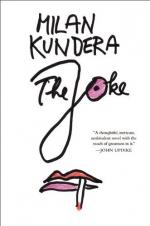|
This section contains 316 words (approx. 2 pages at 300 words per page) |

|
In Czechoslovakia it's still little more than a year since progressive writers like Milan Kundera were associated with Dubcek's noble attempt to build 'socialism with a human face'. Against this political background, The Joke tends to overwhelm with meaning. Literature and politics coalesce particularly closely in that the novel deals with the total disruption of the main character's life by politics….
[The] end is achieved by extremely sophisticated means, both in construction (with its dislocated time-sequence) and character. The anti-hero Ludvik is a classic alienated outsider. His ironic objectivity is essential to his part in the plot. It causes his sufferings; it enables him to survive camp life unscathed; it dominates his mode of revenge, which demands that he should stand aside emotionally from his own lovemaking and treat his mistress only as a pawn in his plan. It also enables the author to satirise communist reasoning and...
|
This section contains 316 words (approx. 2 pages at 300 words per page) |

|


